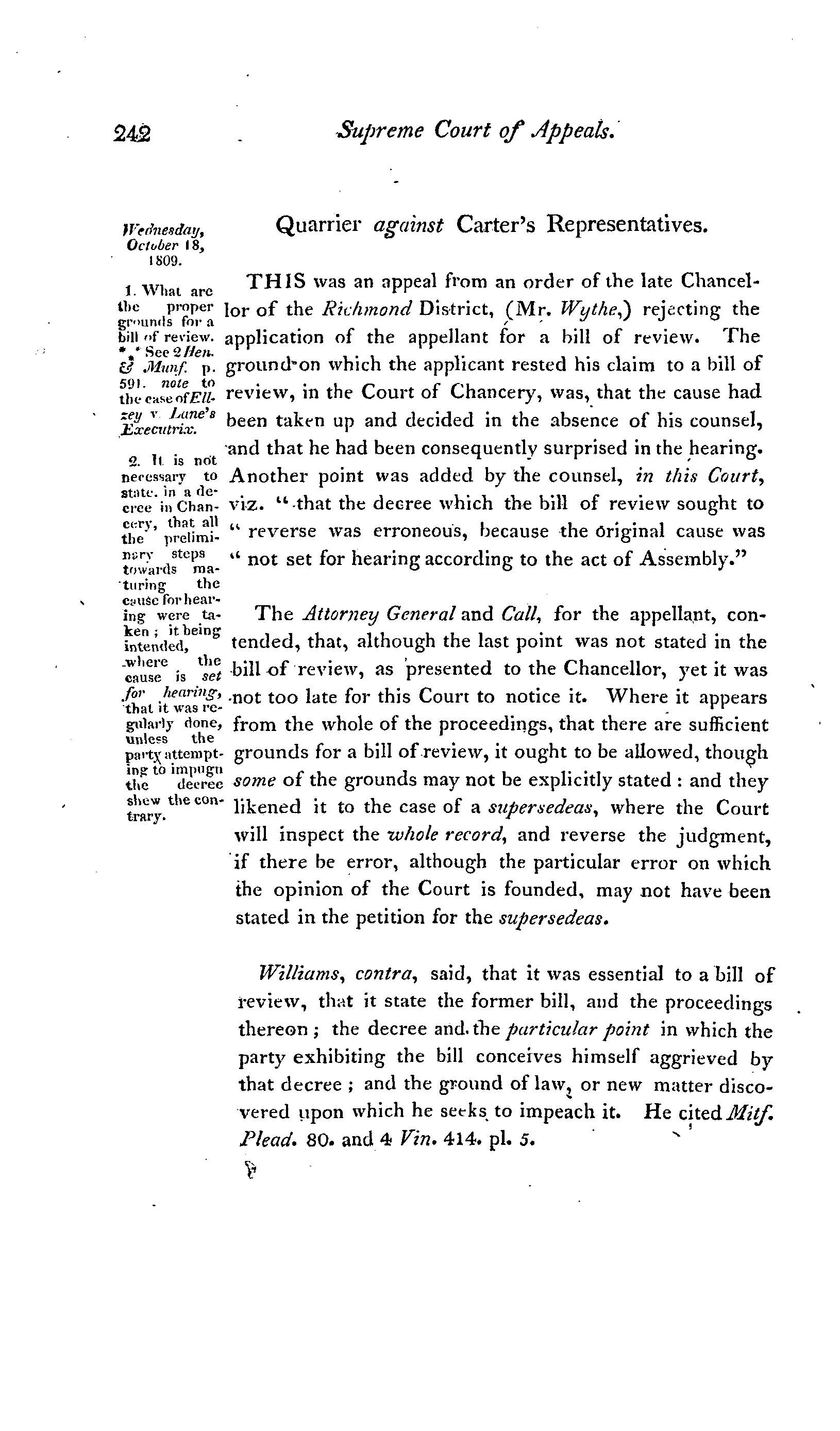Difference between revisions of "Quarrier v. Carter's Rep."
m |
m |
||
| Line 1: | Line 1: | ||
| − | {{DISPLAYTITLE:''Quarrier v. Carter's | + | {{DISPLAYTITLE:''Quarrier v. Carter's Representative''}} |
[[File:HeningMunfordQuarriervCarter's_Rep1811v4p242.jpg|link={{filepath:Hening&MunfordsReports1811V4QuarriervCarter's_Rep.pdf}}|thumb|right|300px|First page of the opinion [[Media:Hening&MunfordsReports1811V4QuarriervCarter's_Rep.pdf |''Quarrier v. Carter's Rep.'']], in [https://catalog.libraries.wm.edu:443/01COWM_WM:EVERYTHING:01COWM_WM_ALMA21593279330003196 ''Reports of Cases Argued and Determined in the Supreme Court of Appeals of Virginia: With Select Cases, Relating Chiefly to Points of Practice, Decided by the Superior Court of Chancery for the Richmond District''], by William Hening and William Munford. New York: I. Riley, 1811.]] | [[File:HeningMunfordQuarriervCarter's_Rep1811v4p242.jpg|link={{filepath:Hening&MunfordsReports1811V4QuarriervCarter's_Rep.pdf}}|thumb|right|300px|First page of the opinion [[Media:Hening&MunfordsReports1811V4QuarriervCarter's_Rep.pdf |''Quarrier v. Carter's Rep.'']], in [https://catalog.libraries.wm.edu:443/01COWM_WM:EVERYTHING:01COWM_WM_ALMA21593279330003196 ''Reports of Cases Argued and Determined in the Supreme Court of Appeals of Virginia: With Select Cases, Relating Chiefly to Points of Practice, Decided by the Superior Court of Chancery for the Richmond District''], by William Hening and William Munford. New York: I. Riley, 1811.]] | ||
| − | In [[Media:Hening&MunfordsReports1811V4QuarriervCarter's_Rep.pdf |''Quarrier v. Carter's Rep.'']], 14 Va. (4 Hen. & M.) 242 (1809),<ref>William Hening & William Munford, ''Reports of Cases Argued and Determined in the Supreme Court of Appeals of Virginia: with Select Cases, Relating Chiefly to Points of Practice, Decided by the Superior Court of Chancery for the Richmond District | + | In [[Media:Hening&MunfordsReports1811V4QuarriervCarter's_Rep.pdf |''Quarrier v. Carter's Rep.'']], 14 Va. (4 Hen. & M.) 242 (1809),<ref>William Hening & William Munford, ''Reports of Cases Argued and Determined in the Supreme Court of Appeals of Virginia: with Select Cases, Relating Chiefly to Points of Practice, Decided by the Superior Court of Chancery for the Richmond District'' (New York: I. Riley, 1811), 4:242.</ref> the Court determined the proper grounds for an equitable bill of review. |
| + | |||
==Background== | ==Background== | ||
Quarrier filed a bill of review in the High Court of Chancery. The bill claimed that Wythe’s initial judgment should be set aside since Quarrier’s attorney did not show up to court and consequently surprised at the hearing. Quarrier’s counsel to the Court of Appeals argued additional reasons why the court should consider the bill of review that were not initially stated. Counsel reasoned that although the arguments were not raised before Chancellor Wythe, the Court of Appeals could still consider those arguments in their deliberations. | Quarrier filed a bill of review in the High Court of Chancery. The bill claimed that Wythe’s initial judgment should be set aside since Quarrier’s attorney did not show up to court and consequently surprised at the hearing. Quarrier’s counsel to the Court of Appeals argued additional reasons why the court should consider the bill of review that were not initially stated. Counsel reasoned that although the arguments were not raised before Chancellor Wythe, the Court of Appeals could still consider those arguments in their deliberations. | ||
| + | |||
===The Court's Decision=== | ===The Court's Decision=== | ||
[[George Wythe|Chancellor Wythe]] disallowed the bill of review. The Court of Appeals affirmed stating that a bill of review can only be granted when new facts are presented or there is apparent facial error in the decree. | [[George Wythe|Chancellor Wythe]] disallowed the bill of review. The Court of Appeals affirmed stating that a bill of review can only be granted when new facts are presented or there is apparent facial error in the decree. | ||
| + | |||
==See also== | ==See also== | ||
*[[Wythe's Judicial Career]] | *[[Wythe's Judicial Career]] | ||
| Line 14: | Line 17: | ||
__NOTOC__ | __NOTOC__ | ||
[[Category: Cases]] | [[Category: Cases]] | ||
| + | [[Category:Procedure]] | ||
Revision as of 13:35, 5 September 2018

In Quarrier v. Carter's Rep., 14 Va. (4 Hen. & M.) 242 (1809),[1] the Court determined the proper grounds for an equitable bill of review.
Background
Quarrier filed a bill of review in the High Court of Chancery. The bill claimed that Wythe’s initial judgment should be set aside since Quarrier’s attorney did not show up to court and consequently surprised at the hearing. Quarrier’s counsel to the Court of Appeals argued additional reasons why the court should consider the bill of review that were not initially stated. Counsel reasoned that although the arguments were not raised before Chancellor Wythe, the Court of Appeals could still consider those arguments in their deliberations.
The Court's Decision
Chancellor Wythe disallowed the bill of review. The Court of Appeals affirmed stating that a bill of review can only be granted when new facts are presented or there is apparent facial error in the decree.
See also
References
- ↑ William Hening & William Munford, Reports of Cases Argued and Determined in the Supreme Court of Appeals of Virginia: with Select Cases, Relating Chiefly to Points of Practice, Decided by the Superior Court of Chancery for the Richmond District (New York: I. Riley, 1811), 4:242.